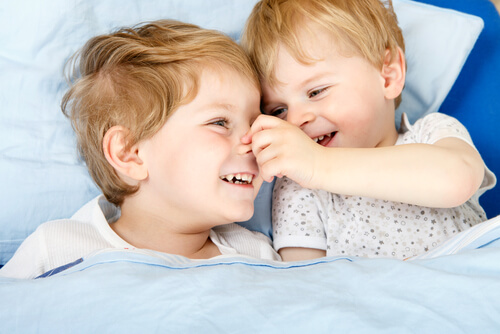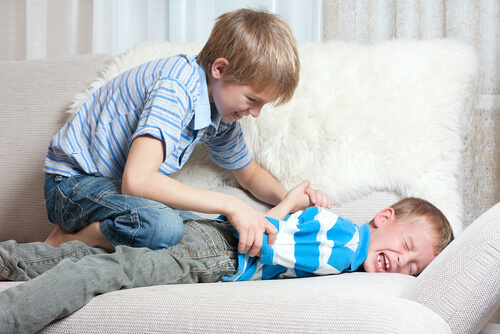How to Avoid Jealousy between Siblings?

It’s very important for parents to know how to act in order to avoid jealousy between siblings. This will also prevent conflicts in the future.
Jealousy is a natural emotion that human beings portray when they have the fear of losing an affective bond.
In a family, it’s normal for this emotion to arise before the arrival of a new sibling. The child feels like their parents’ affection is at stake.
Some experts believe that jealousy appears spontaneously when a child is told about the arrival of a new sibling. Afterwards, it forms part of the adaptation period when the child starts to realize that they’re no longer the family’s center of attention.
The premonition that there will be a loss of love or attention from the people that are most important to them can trigger many different emotions.
Although it can be normal, parents should try to prevent jealousy between siblings to the extent possible. If the child feels intense jealousy it can lead to depression, anxiety or low self-esteem.
This could in turn generate negative tension that will affect the entire family.
Causes of jealousy between siblings
Fear is jealousy’s foundation. The child is dominated by the anguish of losing their parents’ love and affection.
Jealousy appears when the child feels like their feelings aren’t being reciprocated with the intensity or frequency that they would like.

Another cause of jealousy is the mother’s attitude change before the birth of a new child.
This change may be difficult to tolerate from a child who is used to relating to their parents in a certain way. The child may start to believe they’re getting replaced.
Sometimes parents use persuasion techniques with their children which may be harmful. Phrases such as “if you don’t eat, mom won’t play with you.”
The child may interpret that phrase negatively; they may start to believe their mother will only play with a child who fulfills her wishes.
Comparisons can also be a cause of jealousy and therefore they should be avoided. Every child is unique and they should be valued all the same.
Contrary to what most people believe, younger siblings may also feel jealousy towards their older siblings. Mutual jealousy can even arise in some cases.
Whenever a sibling believes that others are being treated in a preferential way, there is a risk that jealousy will arise.
Consequences of jealousy
Jealousy brings along negative consequences in a child’s behavior. These are some of the reasons that parents should avoid jealousy between siblings:
- They may adopt aggressive or irritable behavior.
- The child may become withdrawn or sad.
- When they’re small, they might regress in their evolutionary development. For example, they could restart bed-wetting.
- They may have tantrums.
These kinds of behaviors are aimed at obtaining more attention.
How to avoid jealousy between siblings?
It’s important to strengthen the child’s self-esteem. Their uncertainty towards their new sibling can be reduced if they feel that they’re well integrated into the family.
They should know that their parents’ feelings are fair and transparent.

When a new member is about to join the family, parents should maintain a lot of contact with the older siblings. They should explain the changes that will occur.
Make the child part of the positive aspects that the birth of the new child will bring.
Try to maintain the child’s routine that they had before the arrival of the new sibling. Their meals, sleeping and bathing should remain unchanged.
Taking sides with one child or the other is very harmful when there is a conflict between siblings. Parents should try to stay out of these confrontations (to the extent possible) in order for the siblings to resolve it themselves.
Parents should be understanding towards both siblings. Each child may feel like they’re right.
Parents must have the ability to listen to both sides. Each child should feel like their parents understand their arguments. This is the best way to avoid jealousy between siblings.
It’s very important for parents to know how to act in order to avoid jealousy between siblings. This will also prevent conflicts in the future.
Jealousy is a natural emotion that human beings portray when they have the fear of losing an affective bond.
In a family, it’s normal for this emotion to arise before the arrival of a new sibling. The child feels like their parents’ affection is at stake.
Some experts believe that jealousy appears spontaneously when a child is told about the arrival of a new sibling. Afterwards, it forms part of the adaptation period when the child starts to realize that they’re no longer the family’s center of attention.
The premonition that there will be a loss of love or attention from the people that are most important to them can trigger many different emotions.
Although it can be normal, parents should try to prevent jealousy between siblings to the extent possible. If the child feels intense jealousy it can lead to depression, anxiety or low self-esteem.
This could in turn generate negative tension that will affect the entire family.
Causes of jealousy between siblings
Fear is jealousy’s foundation. The child is dominated by the anguish of losing their parents’ love and affection.
Jealousy appears when the child feels like their feelings aren’t being reciprocated with the intensity or frequency that they would like.

Another cause of jealousy is the mother’s attitude change before the birth of a new child.
This change may be difficult to tolerate from a child who is used to relating to their parents in a certain way. The child may start to believe they’re getting replaced.
Sometimes parents use persuasion techniques with their children which may be harmful. Phrases such as “if you don’t eat, mom won’t play with you.”
The child may interpret that phrase negatively; they may start to believe their mother will only play with a child who fulfills her wishes.
Comparisons can also be a cause of jealousy and therefore they should be avoided. Every child is unique and they should be valued all the same.
Contrary to what most people believe, younger siblings may also feel jealousy towards their older siblings. Mutual jealousy can even arise in some cases.
Whenever a sibling believes that others are being treated in a preferential way, there is a risk that jealousy will arise.
Consequences of jealousy
Jealousy brings along negative consequences in a child’s behavior. These are some of the reasons that parents should avoid jealousy between siblings:
- They may adopt aggressive or irritable behavior.
- The child may become withdrawn or sad.
- When they’re small, they might regress in their evolutionary development. For example, they could restart bed-wetting.
- They may have tantrums.
These kinds of behaviors are aimed at obtaining more attention.
How to avoid jealousy between siblings?
It’s important to strengthen the child’s self-esteem. Their uncertainty towards their new sibling can be reduced if they feel that they’re well integrated into the family.
They should know that their parents’ feelings are fair and transparent.

When a new member is about to join the family, parents should maintain a lot of contact with the older siblings. They should explain the changes that will occur.
Make the child part of the positive aspects that the birth of the new child will bring.
Try to maintain the child’s routine that they had before the arrival of the new sibling. Their meals, sleeping and bathing should remain unchanged.
Taking sides with one child or the other is very harmful when there is a conflict between siblings. Parents should try to stay out of these confrontations (to the extent possible) in order for the siblings to resolve it themselves.
Parents should be understanding towards both siblings. Each child may feel like they’re right.
Parents must have the ability to listen to both sides. Each child should feel like their parents understand their arguments. This is the best way to avoid jealousy between siblings.
All cited sources were thoroughly reviewed by our team to ensure their quality, reliability, currency, and validity. The bibliography of this article was considered reliable and of academic or scientific accuracy.
- Ainsworth, M.D.S. (1989). Atachment beyond infancy. American Psychology, 44, 709-716.
- Arranz Freijo, E. (2000). Interacción entre hermanos y desarrollo psicológico: una propuesta educativa. https://minerva.usc.es/xmlui/bitstream/handle/10347/5181/pg_313-334_inneduc10.pdf?sequence=1
- Howe, N. y Recchia, H. (2014). Las relaciones entre hermanos y su impacto en el desarrollo de los niños. Concordia University, Canadá. Recuperado de: http://www.enciclopedia-infantes.com/sites/default/files/textes-experts/es/2592/las-relaciones-entre-hermanos-y-su-impacto-en-el-desarrollo-de-los-ninos.pdf
- Velasco, T. (2011). Conociendo un poco más el apego. Pedagogía Magna.
This text is provided for informational purposes only and does not replace consultation with a professional. If in doubt, consult your specialist.








